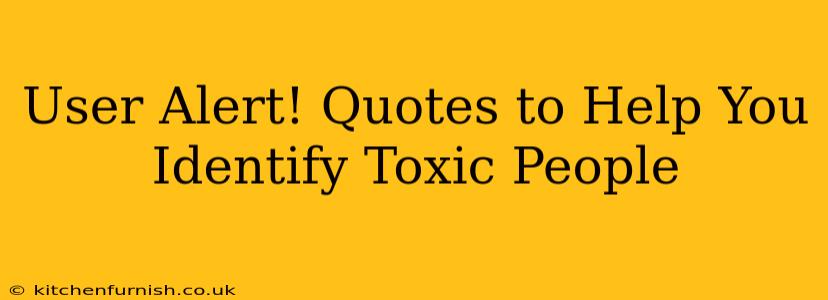Navigating the complexities of human relationships can be challenging, and sometimes, we find ourselves entangled with individuals who drain our energy and negatively impact our well-being. These are often referred to as toxic people. Identifying them early can be crucial to protecting your mental and emotional health. While there's no single magic bullet for spotting toxicity, certain red flags consistently emerge in their behavior and communication style. This article uses insightful quotes to illuminate common traits of toxic individuals, empowering you to recognize and address these challenging relationships.
What Makes Someone a Toxic Person?
Before diving into the quotes, it's important to define what constitutes "toxic" behavior. It's not about minor disagreements or occasional personality clashes; toxicity stems from consistent patterns of negativity, manipulation, and disrespect. Toxic people often lack empathy, exhibit controlling tendencies, and engage in behaviors that undermine others' self-esteem. They may thrive on drama, constantly seeking attention or validation through negativity.
Quotes That Highlight Toxic Behaviors:
Here are some quotes that capture the essence of toxic relationships, providing valuable insight into how to recognize these individuals:
"The best way to find out if you can trust somebody is to trust them." —Ernest Hemingway This quote, while seemingly simple, highlights a crucial aspect of toxic relationships: the consistent breach of trust. Toxic people rarely keep their word, often betraying confidences and manipulating situations to their advantage. Look for patterns of broken promises and unreliable behavior.
"A person who is truly happy does not need to convince others of their happiness." – Unknown Toxic people often seek external validation through constant boasting or one-upmanship. They might downplay your achievements or exaggerate their own to feel superior. Genuine happiness doesn't require constant self-promotion.
"The only person you are destined to become is the person you decide to be." —Ralph Waldo Emerson Toxic individuals often attempt to control others' lives, imposing their beliefs and desires onto others. This quote underscores the importance of self-determination and recognizing attempts to stifle your personal growth and choices.
"The most common way people give up their power is by thinking they don't have any." —Alice Walker Toxic people often subtly or overtly manipulate others into feeling powerless. They might use guilt trips, intimidation, or emotional blackmail to control situations and gain an upper hand. Be mindful of situations where you feel diminished or manipulated.
"Kindness is a language which the deaf can hear and the blind can see." —Mark Twain A lack of genuine kindness is a significant indicator of a toxic relationship. Observe how the person treats others, not just you. Consistent cruelty or disregard for the feelings of others is a massive red flag.
How do I deal with a toxic person?
This is a multifaceted question, and the best approach depends heavily on your relationship with the toxic individual. Sometimes, setting firm boundaries and limiting contact is the healthiest option. In other cases, professional intervention (therapy or counseling) might be necessary to process the impact of the relationship and develop healthier coping mechanisms.
What are the signs of a toxic friendship?
Signs of toxic friendships often mirror those in other toxic relationships: constant negativity, manipulation, one-upmanship, lack of support, and a consistent feeling of being drained after interacting with the friend.
How can I protect myself from toxic people?
Protecting yourself involves self-awareness, boundary-setting, and choosing your relationships wisely. Listen to your intuition; if a relationship feels consistently draining or negative, it's time to re-evaluate.
What are the long-term effects of being around toxic people?
Long-term exposure to toxicity can lead to increased stress, anxiety, depression, and a diminished sense of self-worth. It can also impact physical health, leading to sleep disturbances, digestive problems, and a weakened immune system.
By understanding these warning signs, using these insights, and employing healthy boundaries, you can better navigate challenging relationships and protect your well-being. Remember, prioritizing your mental and emotional health is crucial. If you're struggling with a toxic relationship, consider seeking support from a therapist or counselor.

